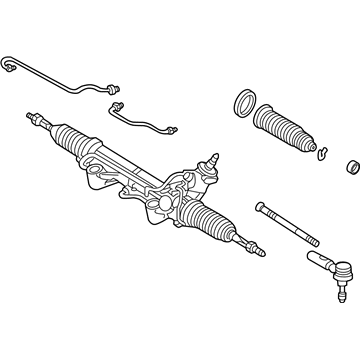FordParts
My Garage
My Account
Cart
OEM 2009 Ford Ranger Rack And Pinion
Steering Rack And Pinion- Select Vehicle by Model
- Select Vehicle by VIN
Select Vehicle by Model
orMake
Model
Year
Select Vehicle by VIN
For the most accurate results, select vehicle by your VIN (Vehicle Identification Number).
3 Rack And Pinions found
2009 Ford Ranger Steering Gear Part Number: 9L5Z-3504-ARM
$271.29 MSRP: $432.73You Save: $161.44 (38%)Ships in 1-3 Business DaysProduct Specifications- Other Name: Remanufactured Gear Assembly - Steering; Rack and Pinion Assembly; Steering Gearbox; Gear Assembly; Gear Assembly - Steering
- Manufacturer Note: Remanufactured
- Replaces: 9L5Z-3504-D, 8L5Z-3504-D, 8L5Z-3504-A, 7L5Z-3504-AD
- Base No.: 3504
- Item Weight: 23.80 Pounds
- Item Dimensions: 6.0 x 11.4 x 52.5 inches
- Condition: New
- Fitment Type: Direct Replacement
- SKU: 9L5Z-3504-ARM
- Warranty: This genuine part is guaranteed by Ford's factory warranty.
2009 Ford Ranger Steering Gear Part Number: 9L5Z-3504-CRM
Product Specifications- Other Name: Remanufactured Gear Assembly - Steering; Rack and Pinion Assembly; Steering Gearbox; Gear Assembly; Gear Assembly - Steering
- Manufacturer Note: Remanufactured
- Replaces: 7L5Z-3504-CD, 8L5Z-3504-C, 9L5Z-3504-F, STG-417, STG-365, 8L5Z-3504-F, STG-297
- Base No.: 3504
- Item Weight: 25.10 Pounds
- Item Dimensions: 5.8 x 11.2 x 52.5 inches
- Condition: New
- Fitment Type: Direct Replacement
- SKU: 9L5Z-3504-CRM
- Warranty: This genuine part is guaranteed by Ford's factory warranty.
2009 Ford Ranger Steering Gear Part Number: 9L5Z-3504-BRM
$354.83 MSRP: $560.00You Save: $205.17 (37%)Product Specifications- Other Name: Remanufactured Gear Assembly - Steering; Rack and Pinion Assembly; Steering Gearbox; Gear Assembly; Gear Assembly - Steering
- Manufacturer Note: Remanufactured
- Replaces: STG-364, 8L5Z-3504-E, 8L5Z-3504-B, 9L5Z-3504-E, 7L5Z-3504-BC, 7L5Z-3504-BB, STG-290, STG-416, STG-395
- Base No.: 3504
- Item Weight: 22.20 Pounds
- Item Dimensions: 6.1 x 11.1 x 53.0 inches
- Condition: New
- Fitment Type: Direct Replacement
- SKU: 9L5Z-3504-BRM
- Warranty: This genuine part is guaranteed by Ford's factory warranty.
2009 Ford Ranger Rack And Pinion
If you're seeking quality and affordability, look no further than our extensive inventory of genuine 2009 Ford Ranger Rack And Pinion available at FordPartsDeal.com. You can confidently purchase our OEM 2009 Ford Ranger Rack And Pinion as they are supported by the manufacturer's warranty and our hassle-free return policy, alongside the benefit of our fast delivery service.
2009 Ford Ranger Rack And Pinion Parts Q&A
- Q: How to Service and Repair the Rack and Pinion on Rear-Wheel Drive on 2009 Ford Ranger?A: In order to service the rack and pinion of a rear wheel drive vehicle, the front wheels must be removed, the steering wheel must be locked and the outer tie-rod ends must be disconnected. Re-fit bolts and O-rings and set the correct torque. Installation of parts again, fill the power steering system and adjust the front toe where required.













